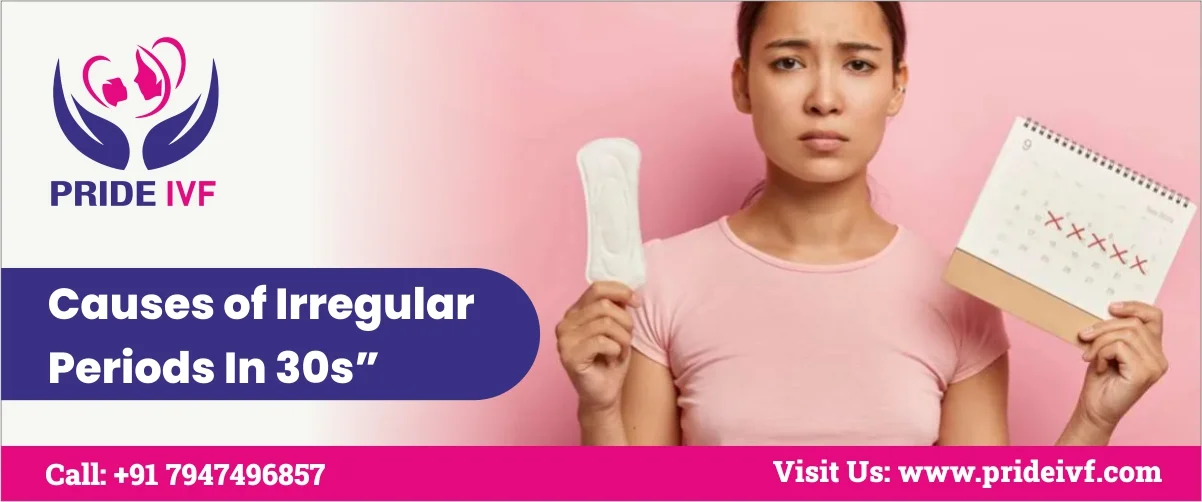In your 30s, going through irregular periods might be confusing and cause concern. Understanding the causes of irregular periods in 30s is essential, as your body undergoes various hormonal changes during this decade, which is also frequently characterized by notable shifts in both personal and professional life. Menstrual irregularities can be natural to some extent, but severe or chronic disruptions may point to underlying medical problems.
In this extensive blog post we will discuss the usual causes of irregular periods in your 30s, possible health risks, and methods for managing your menstrual health.




Understanding Irregular Periods:
Irregular Periods: What Are They?
Menstrual cycles that differ in length, duration, or flow are referred to as irregular periods. What is a normal period cycle: Typically, a normal menstrual cycle lasts between 21 and 35 days, and bleeding lasts between 2 and 7 days. An irregularity may appear as:
- Short Cycles: Shorter than 21 days.
- Extended Cycles: Exceeding 35 days.
- Periods Skipped: Completely missed cycles.
- Signs of heavy or light bleeding include notable variations in the amount of menstrual flow.
- Spotlighting: Spots or light bleeding in between periods.
Some common causes for irregularities in periods in 30s include:
- Imbalances in hormones: Your menstrual cycle is mostly controlled by hormones. In your 30s, a number of things might throw off your hormone balance and cause irregular periods. PCOS, or polycystic ovarian syndrome: a prevalent disorder in which the ovaries overproduce androgens, or male hormones, resulting in irregular periods and ovulation. Acne, weight gain, and excessive hair growth are some symptoms.
Menstrual regularity might impacted by hyperthyroidism or hypothyroidism alike. Estrogen and progesterone must in balance for proper menstrual function. Missed periods or irregular bleeding may signs of an imbalance.
- Stress and Lifestyle Variables: Your menstrual cycle can greatly impacted by your lifestyle and stress levels. Stress levels in your 30s might rise as a result of balancing social expectations, personal obligations, and professional commitments. This can cause high Stress Levels; the hypothalamus, the part of the brain in charge of controlling your menstrual cycle, may impacted by long-term stress. Periods may missed or delayed as a result of this.
Excessive exercise might result in low body fat, which can disrupt hormone synthesis and cause menstrual irregularities. Weight fluctuations notable increases or decreases in weight might throw off menstrual cycles and hormonal balance.
- Challenges with Reproductive Health: Period irregularities can caused by a number of reproductive health issues. Endometriosis a Painful and heavy bleeding condition caused by tissue that resembles the lining of the uterus growing outside of it is one of the most common problems in 30s. Non-cancerous growths in the uterus called uterine fibroids can result in excessive bleeding and irregular menstruation. Pelvic Inflammatory Disease (PID) a reproductive organ infection that can cause abnormal discharge and pelvic discomfort in addition to irregular periods interfere with menstruation cycles and hormonal balance.
- Perimenopause: The period of transition before menopause, known as perimenopause, usually happens between the ages of thirty and forty. Hormone changes at this period might result in unusual Cycles; the length and flow of cycles might change, becoming longer or shorter. Night sweats and hot flashes are common perimenopausal symptoms. There may heavier or lighter periods than normal.
- Drugs and Contraceptives: The drugs and birth control techniques may interfere with your menstrual cycle. The frequency of your menstruation can changed by hormonal Contraceptives birth control tablets, patches, or rings. While some might result in breakthrough bleeding or missing periods, others might contribute to lighter, more regular cycles. Menstrual cycles may be impacted by some medications, such as chemotherapeutic medicines, antipsychotics, and some antidepressants.
- Underlying health Condition: Menstrual regularity may be impacted by long-term medical conditions. Hormone levels and menstrual periods may be impacted by uncontrolled diabetes. Menstrual function may be disrupted by diseases such as lupus or rheumatoid arthritis. Menstrual health and nutrition absorption can impacted by gluten sensitivity or celiac disease.
- Challenges with Reproductive Health: Period irregularities can brought on by difficulties with reproductive health, including fertility issues. Reproductive health conditions such as PCOS and endometriosis can interfere with menstruation and make conception difficult. Contrary to popular belief, irregular periods can occasionally an early indicator of pregnancy, especially if they include minor spotting or fluctuations in cycle length. Taking a home pregnancy test or speaking with your doctor might help clarify whether pregnancy is possible.
Also Read: Causes of Irregular Periods in 20s
Addressing the Root Cause of Irregular Periods
To keep an eye on your cycle trends, use an app or menstrual calendar. This can assist in spotting anomalies and give your healthcare practitioner crucial details.
For a precise diagnosis, it’s crucial to speak with a healthcare professional if you have irregular periods in your 30s. They could advise:
- Blood tests: To measure thyroid function, hormone levels, and other parameters.
- Ultrasound: To check for diseases like fibroids or PCOS in the uterus and ovaries.
- Pelvic Exam: To look for indications of abnormalities or infections in the reproductive organs.
- Endometrial Biopsy: In case abnormal bleeding or problems with the lining of the uterus are of concern.
| Causes of Irregular Periods | ||
| Age Group | Causes | Treatments |
| 20s | – Hormonal Imbalance – Stress and Anxiety – Weight Fluctuations – Polycystic Ovary Syndrome (PCOS) – Thyroid Disorders – Birth Control Methods – Intense Exercise |
– Hormonal therapy – Stress management techniques – Balanced diet and regular exercise – Medications for PCOS – Thyroid medication – Adjusting birth control methods – Moderating exercise routines |
| 30s | – Pregnancy and Postpartum – Stress and Lifestyle Changes – Weight Changes – PCOS – Thyroid Disorders – Uterine Fibroids – Endometriosis |
– Prenatal and postnatal care – Stress management techniques – Balanced diet and regular exercise – Medications for PCOS – Thyroid medication – Medications or surgery for fibroids – Treatment for endometriosis (medication or surgery) |
| 40s | – Perimenopause – Hormonal Imbalance – Stress – Weight Changes – Thyroid Disorders – Uterine Fibroids – Endometrial Hyperplasia |
– Hormone replacement therapy (HRT) – Stress management techniques – Balanced diet and regular exercise – Thyroid medication – Medications or surgery for fibroids – Treatment for endometrial hyperplasia (medication or surgery) |
Tips to Prevent Irregular Periods
After a diagnosis of the underlying reason of your irregular periods, you may be treated with:
- Hormone Therapy: To control symptoms associated with hormone imbalances and to regulate cycles Hormone Replacement Therapy (HRT) In cases of severe hormonal imbalances or perimenopause on even birth control pills might recommended.
- Lifestyle Modifications: In such an era where everyone is dealing with some or the other stress one should focus on stress reducing and its effects on your menstrual cycle by practicing mindfulness, meditation, or counseling. Hormonal equilibrium can supported by maintaining a healthy weight through a balanced diet and moderate exercise. Modifying exercise regimens to prevent overtraining can aid in the restoration of menstrual regularity. Problems with the uterine lining or bleeding.
- Medical Treatments : Using certain drugs to treat endometriosis, PCOS, or thyroid issues or even some surgical procedures may explored in situations of fibroids, endometriosis, or other structural abnormalities to get rid of irregular periods and persistent problems.
- Fertility Treatment: Treatments like ovulation induction or assisted reproductive technologies (ART) may be taken into consideration if irregular periods associated with fertility problems.
- Alternative Medical Interventions: Acupuncture has used by some women to treat irregular menstruation. At times even herbal Supplements such as evening primrose oil or chaste tree can also be effective, however one should see your doctor before using them as there are differences in their safety and effectiveness on an individual basis.
- Regular Check-Ups: Make an appointment for routine gynecological exams and heed your doctor’s advice for tracking and managing your menstrual health.
It highly recommended you get medical help if you encounter any significant Changes in the timing of your menstruation. Even after making lifestyle modifications irregular patterns in period cycle persists
Also do not ignore severe Pain or Other Symptoms like unusual discharge, severe pain, or other worrisome symptoms.
To deal with such problems Pride IVF Centre in Delhi, one of the most trusted committed to offering women of all ages thorough, kind, and individualized treatment. Regardless of whether you require specialist treatment or everyday care, our team of knowledgeable healthcare experts is ready to assist your individual needs. See how we can assist you in maintaining the best possible health and wellbeing by looking through the wide range of female health services.
Our team of highly qualified experts committed to being on the cutting edge of developments in women’s health. We customize our care to fit your unique requirements and preferences. Creating a warm and encouraging environment for each patient is our top priority. We make it simple for you to obtain the treatment you need with accessible locations and flexible appointment hours.




Conclusion
In your 30s, irregular periods could indicate a number of underlying problems, such as reproductive health disorders, lifestyle variables, and hormone imbalances. Efficient management of menstruation health necessitates an understanding of possible reasons and prompt medical help. You may overcome the difficulties associated with irregular periods and preserve general wellbeing by taking proactive measures to take care of your health and treating the underlying reasons.
Don’t embarrassed to contact a healthcare professional if you have questions regarding your menstrual cycle or require specific guidance. You can experience greater general health and a healthier, more balanced menstrual cycle with the appropriate support and care.
FAQs:
Q) What are the common signs of irregular periods?
Irregular periods can show few symptoms like cycle duration variations (longer or shorter than typical).
Missing cycles or skipped intervals, menstrual flow variations, such as abnormally heavy or mild bleeding.
Hemorrhage or spotting in between cycles.
Q) How may stress impact my monthly cycle?
Your hormonal balance can disrupted by high amounts of stress, especially when it comes to the release of cortisol. Your menstrual cycle may get disrupted as a result, resulting in irregular periods. Relaxation methods, yoga, and meditation are examples of stress-reduction strategies that might reduce these impacts.
Q) Can modifications in lifestyle affect irregular menstruation?
Absolutely, your menstrual cycle can impacted by lifestyle choices such as food habits, overindulgence in strenuous activity, and inadequate sleep. Hormonal balance and cycle regulation can supported by eating a balanced diet, exercising moderately, and getting regular, high-quality sleep.
Q) What is perimenopause, and how does it impact my periods in my 30s?
The transitional phase that precedes menopause, which usually starts in your late 30s or early 40s (Read: Causes Of Irregular Periods In 40s), known as perimenopause. Hormonal fluctuations during this time can cause irregular periods, changes in flow, and variations in cycle length. These effects can reduced with the use of stress-reduction strategies including yoga, meditation, and relaxation exercises.
Q) Does irregular menstruation have an impact on fertility?
Infertility-related underlying disorders like PCOS or endometriosis may manifest as irregular menstruation. It’s crucial to see a healthcare professional for an assessment and potential fertility treatments if you’re attempting to conceive and have irregular periods.




